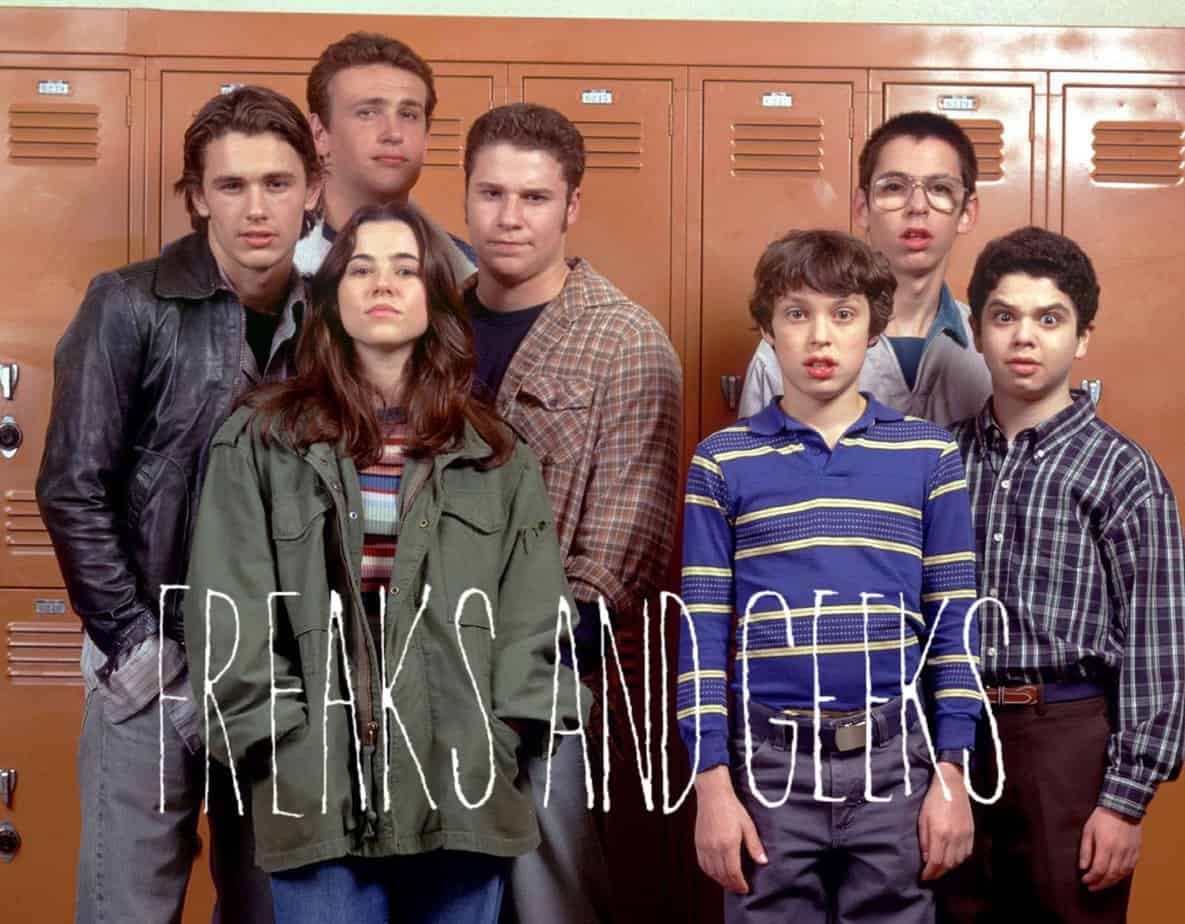Freaks and Geeks is a coming-of-age drama made in the late 1990s, set in 1980. Though it was cancelled after one season, that’s not because it wasn’t good. Perhaps the audience assumed this was yet another high school drama done badly. This show did a lot of stuff you’ll have seen before, but did it extraordinarily well.
Genre Blend Of Freaks And Geeks
Freaks and Geeks is a:
- coming-of-age
- comedy
- drama
This category of story is about the eternal adolescent quest to find out which version of yourself is the “true” one.
How This Show Is Different From Other High School Dramas
It doesn’t fall into the category of ‘cringe comedy’ even though teenagehood inevitably includes embarrassing scenes.
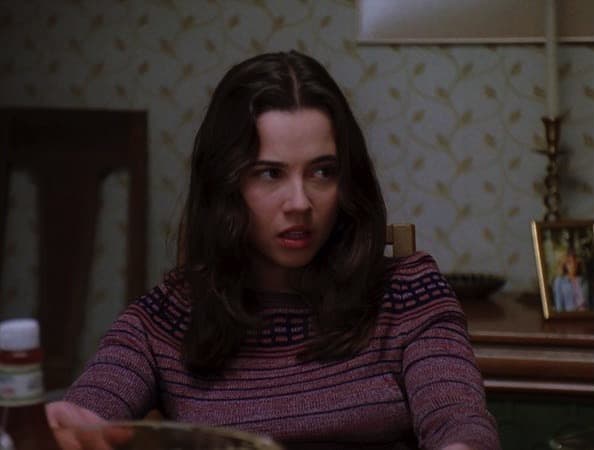
The creators were determined not to end each show with a typical “happy ending”. One notable exception is the pilot episode, which the creators purposely wrote as a self-contained story, in case the show was never picked up for production. This is also why you see a fully fleshed story in the pilot episode and why I’ve chosen to break it down as a story unto itself.
There is plenty of crossover between quite vastly different social arenas, with a main character weaving between all of them. (Though all the families are white.) Most high school dramas have set-in-stone cliques before the audience meets the characters, and the main character is usually an underdog, or a newcomer trying to work out which group to fit into (e.g. Mean Girls). Lindsay is more interesting than that, because although she’s not new to the school but she’s trying to actively switch groups.
Setting of Freaks and Geeks
- Fictional William McKinley High School during the 1980–1981 school year in the town of Chippewa, Michigan, a fictional suburb of Detroit
- A middle-class suburban home near the school
- The surrounding neighbourhood, including some rougher parts of town
- The bleachers are a good place to hide under, to do things teachers can’t see.
- The corridors can be either a walk of shame or a place to parade down. Lockers lining corridors also provide opportunity for characters who hate each other to get together, since lockers are assigned from above.
- The guidance counsellor’s room is a place for moral questions to be posed and discussed.
- Upper middle class (Neal) middle class (Lindsay and Sam) meets working class (Bill) meets military class (Nick) meets houseos (Kim).
- The high school is a miniature big struggle field, where the mottos are about conquer or lose and men must be men. The school cafeteria is a good venue for enemies to be thrown together by force, as everyone has to eat lunch. Classrooms are good venues for characters to be bullied and victimised in front of a small audience.
- The suburbs are cosy at first glance, with their manicured lawns and a 1980s apparent utopia, but dangers lurk around the corner, where you could meet your high school adversary at any time.
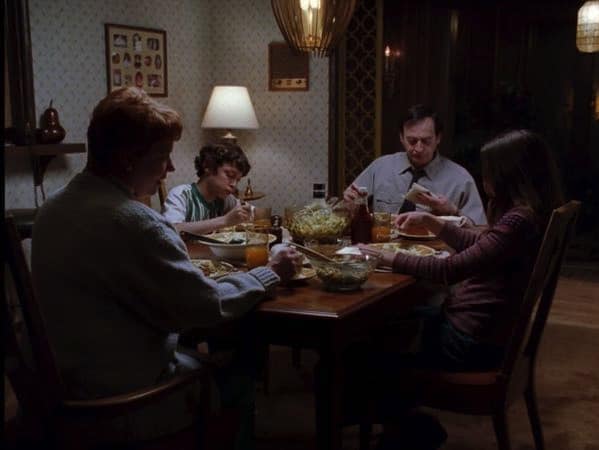
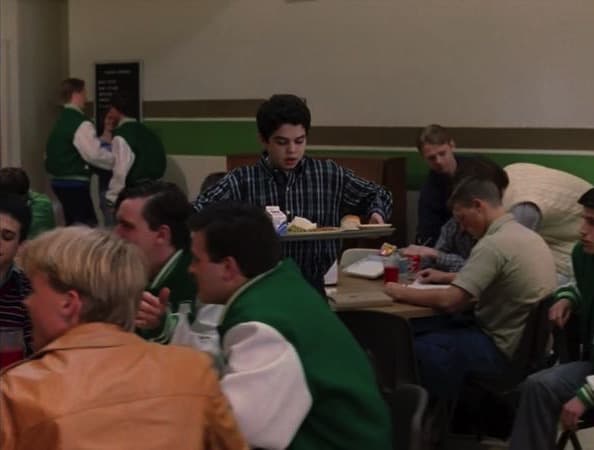
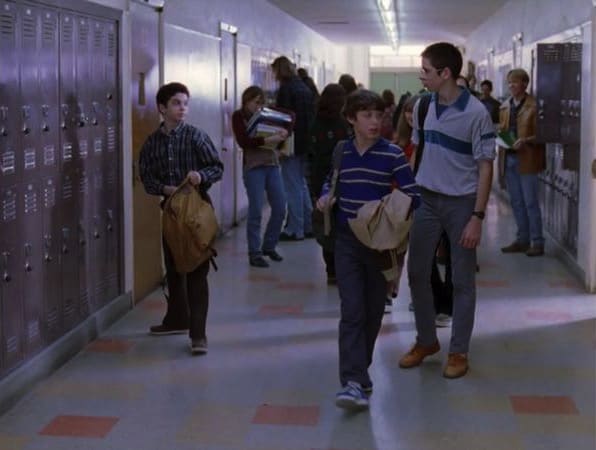
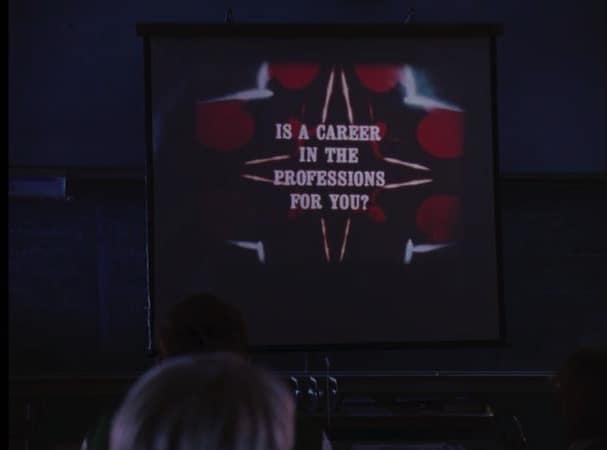
Season Synopsis of Freaks and Geeks
After her grandmother’s death, a high school mathlete starts hanging out with a group of burnouts while her younger brother navigates his freshman year.
ACTION LINE: After her grandmother’s death…
CHARACTER LINE: …a high school mathlete starts hanging out with a group of burnouts while her younger brother navigates his freshman year (We can tell there are dual heroes, brother and sister.)
SENSE OF OUTCOME: (Is missing in the IMDb log line)
Main Characters
Whose Story Is This?
It was always Lindsay’s story. It might have seemed at various times like the other characters, particularly Sam, were sharing the stage with her, and the show did a good job of spreading storylines around to all of the principles, even giving Harold and Jean a few moments in the spotlight. Freaks and Geeks is the story of a girl who found the answers she’d built her life around previously wanting and then listened to a different side of her personality for a while.
Lindsay is changed by everything that happens to her in this season, whether good or bad.
Freaks and Geeks Pilot
The script is quite a bit different from the final product.
They got rid of the character Art, who hung around with Sam, Neil and Bill. This is an interesting decision — it’s always harder to write a group of four than a group of three. They bring a fourth guy in when they need him (see the final big struggle).
They shortened some dialogue and lengthened others. They took out quite a bit of Eli, probably because it felt too mean.
Anagnorisis, need, desire
1. Lindsay will learn that being ‘good’ isn’t necessarily going to work for her. Sticking up for Eli falls flat. She is embarrassed by her childhood friend Millie. This is the beginning of her trying to work out a new way to be.
2. She knows that being a mathlete and friends with Millie are doing her no good socially, and that she is no longer enjoying this persona she has ended up with.
3. Her tendency to help others can end up harming them. Her need to find a new identity for herself necessarily harms those who have been most loyal. Lindsay is not very loyal.
Despite her academic achievements, Lindsay has never set out any personal goals for herself. She has simply adhered to the belief that her studies would someday reward her in life. She had the motive to succeed in life, but not the passion. And now, even her motive has been severed
Ghost (backstory)
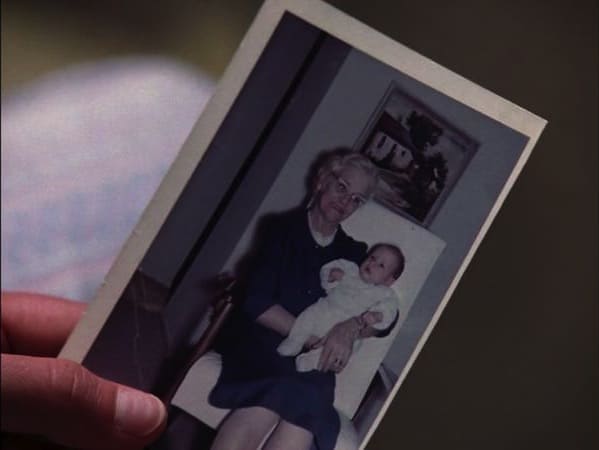
Lindsay’s grandmother has recently died. Lindsay was very close to her grandmother, a fact touched upon when she stares at a picture of the two of them (with Lindsay as a baby) she keeps in her room. Obviously, she felt she had a sense of confidence in Grandma, and was always looking to her for advice. When Grandma died, a part of Lindsay died with her, and she sees no way of reacquiring that sense of love. What affected her most, however, were the final moments the two of them shared together. In a quavering voice, Lindsay asked her bedridden grandmother if she glimpsed a light at the end of the tunnel. Grandma, with her final breath, replied, “No.”
Lindsay took this brief exchange to heart, as is beautifully portrayed in the moving scene she has with Sam in her room. Lindsay makes her bitterness clear – “She was a good person all her life… and this is what she got.” This one line nails Lindsay’s crisis – she’s now convinced herself that all her studies will ultimately lead nowhere. Why bother achieving academically if you’re eventually going to end up in the ground? Lindsay is walking a thin line here, and it will only grow thinner as she draws herself away from her old friends and becomes one of the freaks.
(It’s interesting to note that Millie, who still supports Lindsay despite her obviously changing ways, will (temporarily) follow a path similar to hers in “Dead Dogs and Gym Teachers” [1×14], following the death of someone close to her. I take this as a sign that these girls, despite their intelligence, have spent their lives trying to avoid personal moral confrontations, and it takes something tangibly painful (like death) to make them question where they stand.)
Shortcoming & Need (Problem)
Psychological Shortcoming: Lindsay is obviously having some sort of existential crisis after the death of her beloved grandmother. She’s trying to find the meaning-of-life somehow. The decisions she will make around figuring things out are going to ruin her life as she knows it.
Moral Shortcoming: Lindsay’s hanging out with burnouts means she’s going to absorb/mimic some of their values, dissing earnest, loyal types and disrespecting people who are genuinely trying to help, such as the guidance counsellor and her maths teacher and her parents.
In order to have a better life, Lindsay will have to learn to make independent decisions using her awesome intellect rather than pleasing other people who may not have her best interests at heart.
Lindsay’s crisis: She hates high school. She needs to find a way to survive socially and psychologically in this prison. “Careful… I might go all psycho on you.” – it’s obvious she has taken a page from the freaks’ book. (Another moment of arc setup.)
Inciting Incident
Inciting incident for the bullies plot line:
Alan is about to beat up her brother so Lindsay steps in and saves him. This connects her shortcoming (helping others when it would perhaps be better if she didn’t) and her desire (to get along in high school, which includes protecting her brother.) Lindsay has just got her brother into the worst trouble of his life, because Alan threatens to beat Sam and his buddies up after school instead.
The other inciting incident (for the dance plot line) is that Lindsay and Sam’s father is making them attend, but Lindsay will feel really out of place. She needs to do something to make the night less painful.
Desire
Lindsay wants to be friends with the freaks whilst not alienating her childhood pals too much. She wants to find a life that is completely different from that of her mother — she is afraid of becoming predictable and boring. For now, all Lindsay wants to do is talk to the freaks and not be turned away, and perhaps to go to the school dance together so they can laugh at people together.
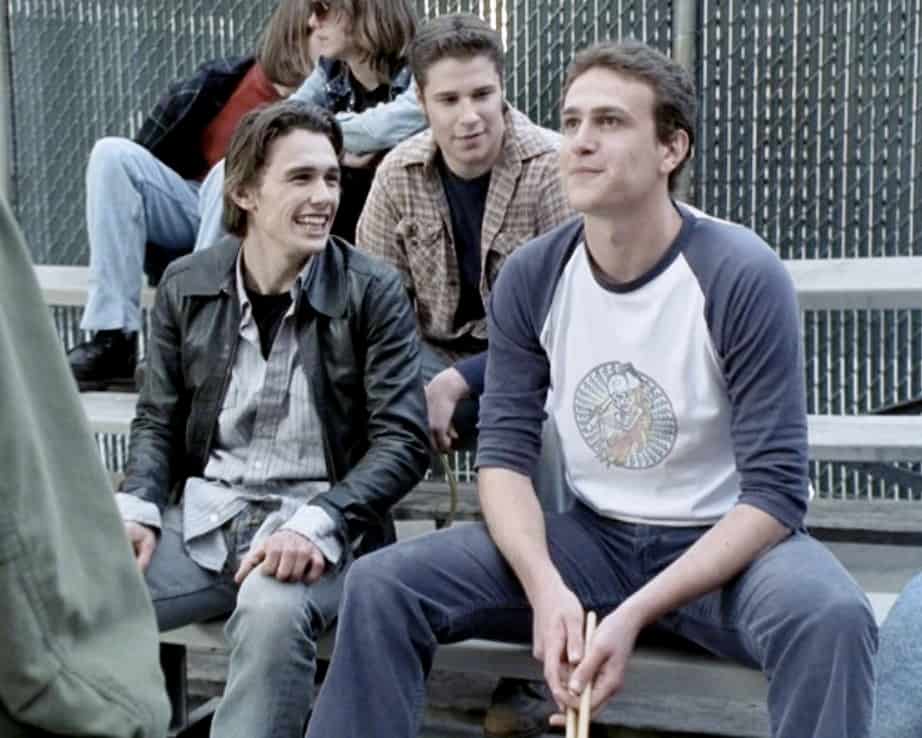
Ally/Allies
Lindsay and Sam are allies by virtue of being siblings who come from a nurturing home. That doesn’t mean they’re always best buds.
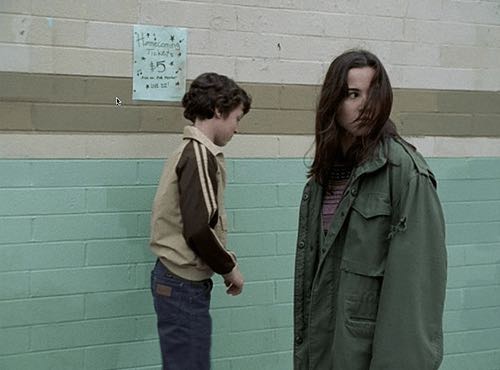
Nick and Daniel Desario are Lindsay’s biggest ally in the freaks group, because he finds her attractive. Ken is much less so, and his sarcasm makes him more of an opponent.
It is Nick, of all people, with whom Lindsay eventually identifies. He cares little for schoolwork, instead choosing to focus on his drums. It’s exactly what Lindsay is looking for – a passion. Nick inspires her to find something she can latch onto and keep for herself. Of course, the only thing Nick wants Lindsay to “latch onto” is him, but at this early stage, she only sees him as a nice guy with a dream.
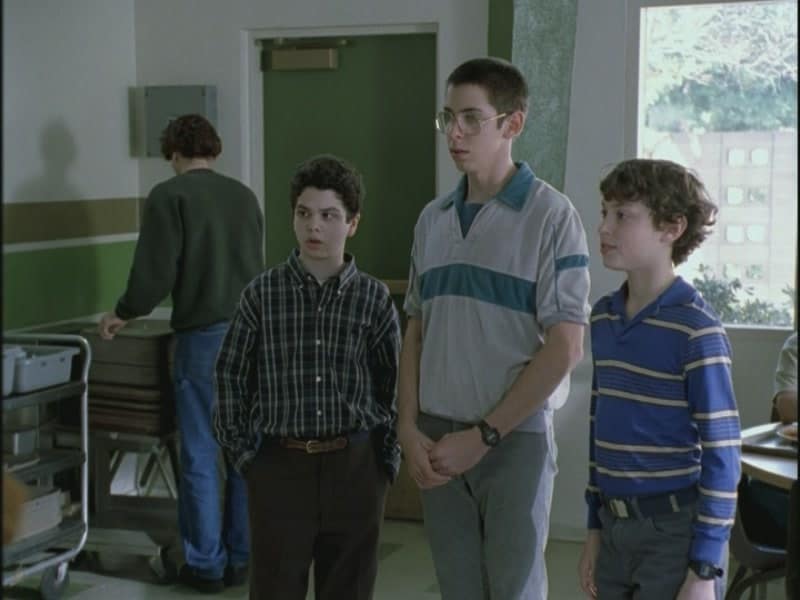
Opponent
(Lindsay’s Storyline)
The mother is caring but has no idea about Lindsay’s world because she is an archetypal housewife who grew up in the 1950s.
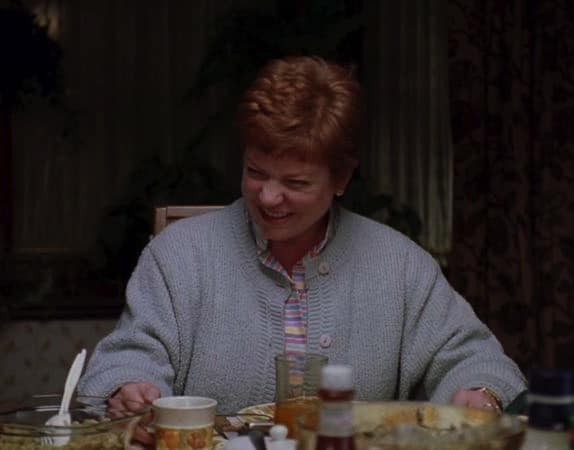
Kim Kelly is the only girl in the Freaks group, and is very resistant to Lindsay joining her crowd, as she feels intimidated by Lindsay and assumes she’s judgemental.
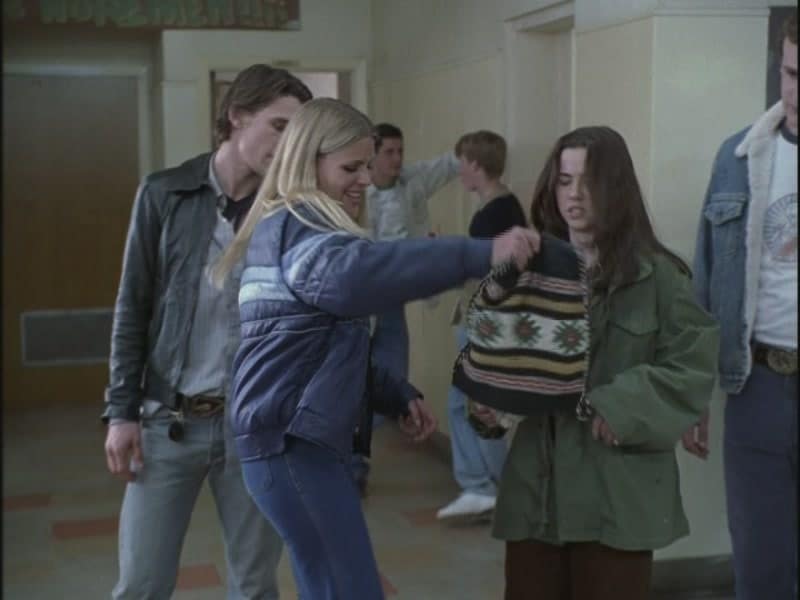
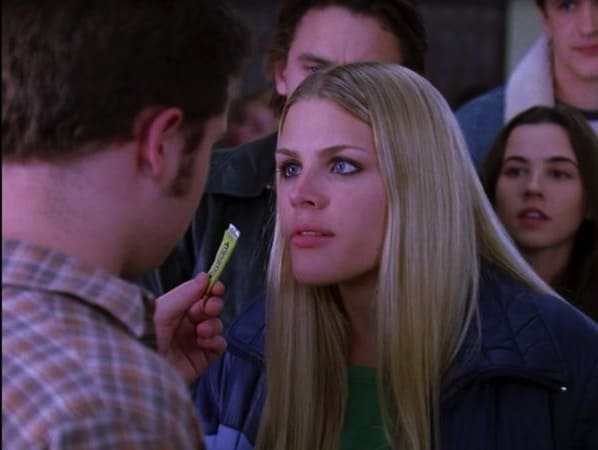
Millie is Lindsay’s ally by intention, though she will unwittingly stand in Lindsay’s way of trying to become less of a perceived swot with no social capital.
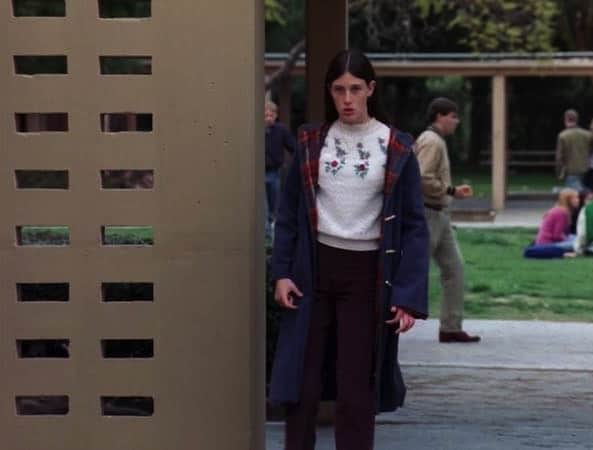
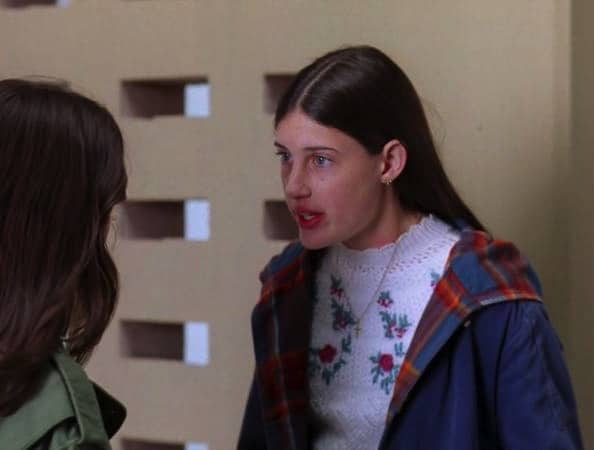
Mr Rosso wants Lindsay to stay in the mathletes. His team can’t win without her.
(Sam’s Storyline)
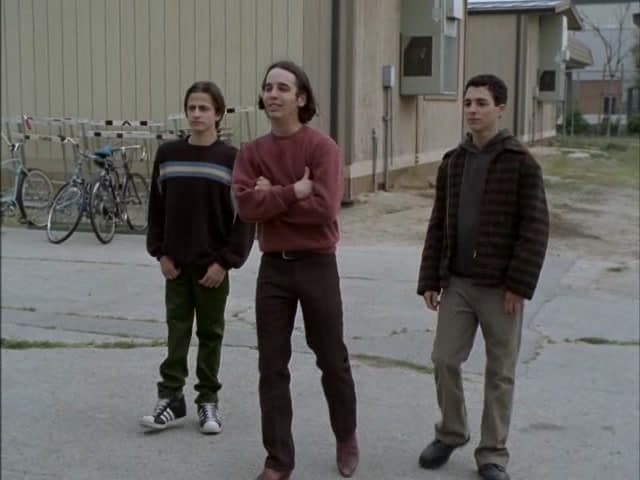
Alan and his two buddies, which makes it three on three. Alan is basically a nerd who is mean, and hasn’t got any passions. So he picks on the boys he perceives to be even nerdier than himself. It’s interesting to note that Alan is portrayed as very one-dimensional in this episode, and that really works. His constant threats toward Sam and his fellow geeks are never followed up upon, and he’s still making them by the episode’s end. Neal and Bill may view their fight with him as a victory over evil, but he just sees it as another in a never-ending line of opportunities to cast off threats and come off as tough. Underneath that mean-spirited exterior, he’s no tougher than any of the geeks. Even when it comes to minor characters, Freaks and Geeks never misses a chance to make an ironically truthful comment about high school.
Their parents oppose them not going to the dance, and in this episode form a partnership of opponents.
The jock P.E. teacher is the boys’ opponent simply by virtue of being a jock who subscribes to a vision of manhood that rests on pure brawn.
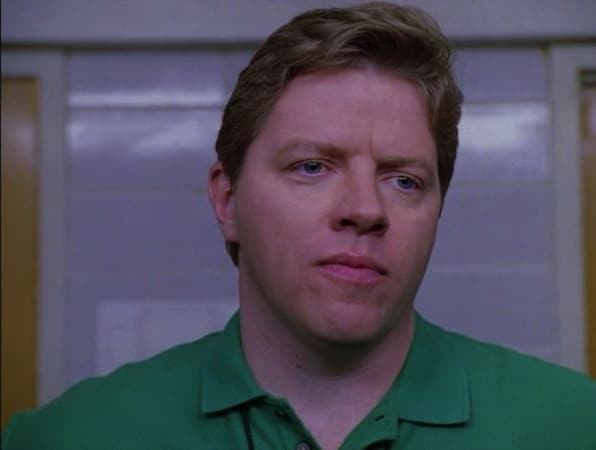
This guy manages to pit an entire P.E. class against the geeks. P.E. class is a microcosm of a social hierarchy in which the entire rest of the boys seem to be against them.
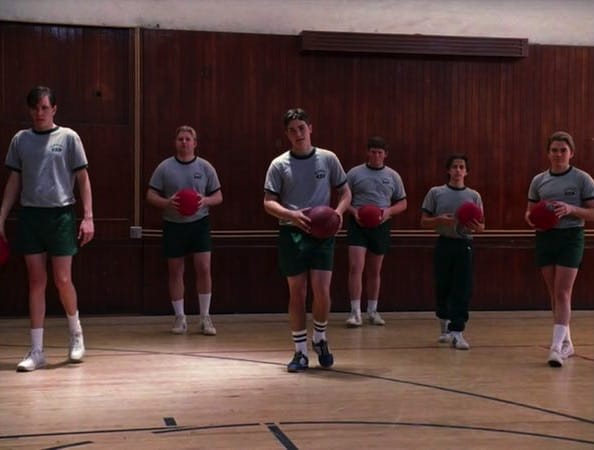
Even the motto on the gym wall highlights the loser/winner dichotomy.
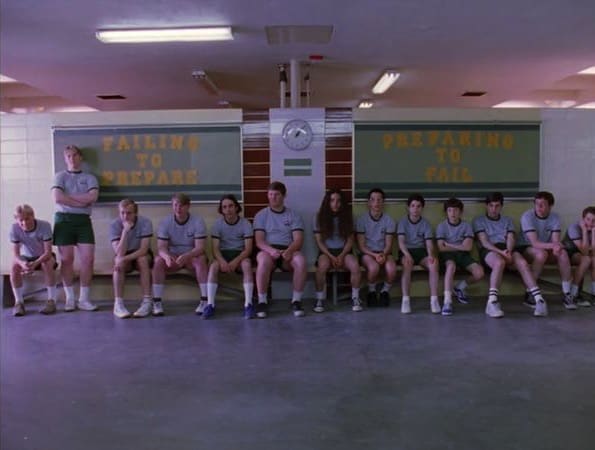
The adults in this story are all opponents, not because they have ill intentions at all, but because they so badly fail to understand the complex social hierarchy enforced by the students.
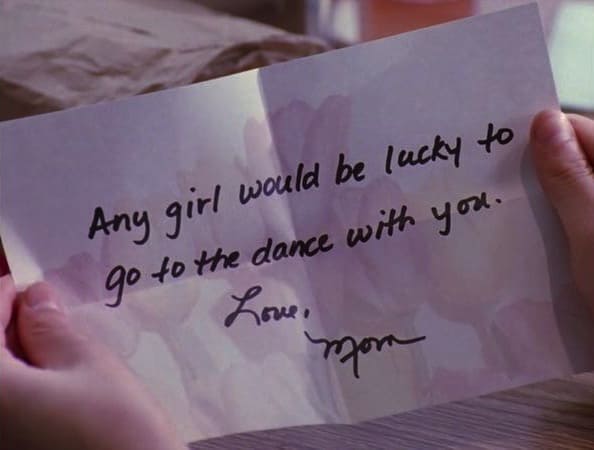
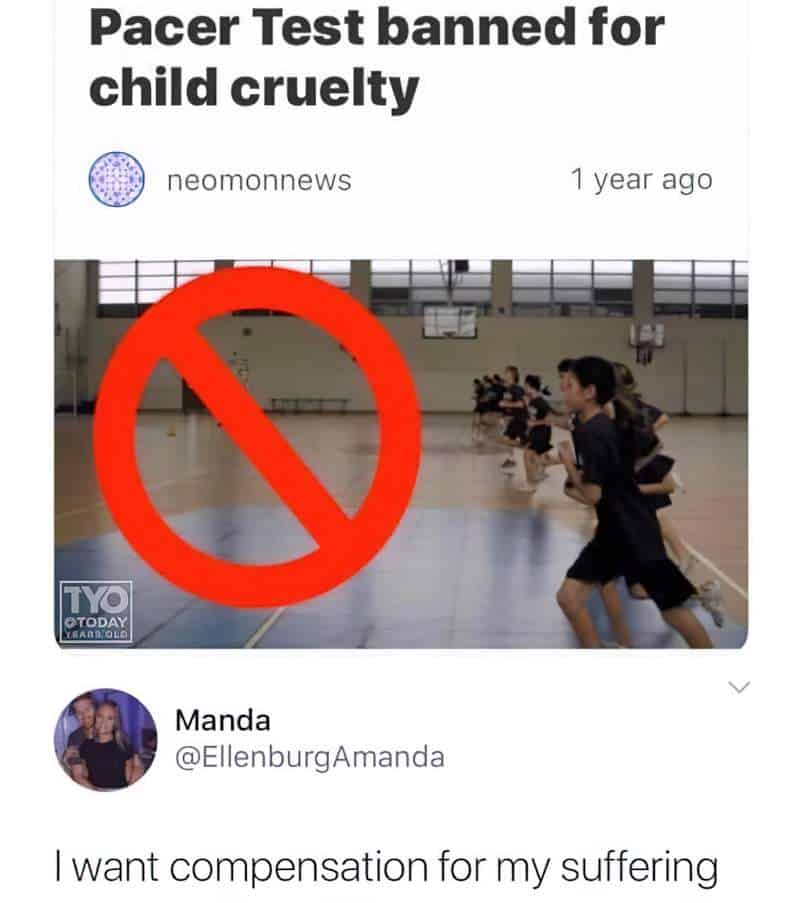
Mystery
The opponents in this story are clearcut, in fact typical for school stories, so there is no mystery required.
Fake-ally opponent
Millie. She wants Lindsay to stay in mathletes because she’s at risk of losing both her best friend and a valuable member of their winning team. Millie values doing as she’s told and doing what she knows to be ‘good’ and ‘worthy’ without considering her own popularity. This makes her the inverse of Lindsay. As is typical, Millie is introduced after Lindsay (the hero) has been introduced.
Mr Rosso is the other fake ally opponent, as teachers often must be. (The teachers themselves wish to be allies — this point is part of the comedy around Mr Rosso and his wish for Lindsay to call him Jeff, which he is forced to retract when Lindsay fails to play ball.) “If the worst thing in your life is somebody makes you go to a dance, then I’d say you have a pretty good life.”
Changed desire and motive
Lindsay intends to skip out on the dance. Next, she is made to go, so she intends to go ‘to make fun of people’, preferably with the freaks for company.
Sam intends to avoid Alan and his friends, but it becomes apparent that this won’t be possible. “We can’t avoid Alan for the rest of our lives!” “You only need to avoid him for four years.” So they intend to turn up. But Sam’s plan changes again when he is delayed by his love interest, Cindy Sanders. It takes him a while to build up to asking her to the dance, and he ends up missing the fight. Meanwhile, the ‘fight’ is more like a comical pantomime.
First revelation and decision
It is revealed to the audience (as Lindsay seems to have already worked it out recently) that she can’t fit in with any of the accepted social groups because she doesn’t share their values. She decides she hates school and might actually have more in common with the freaks.
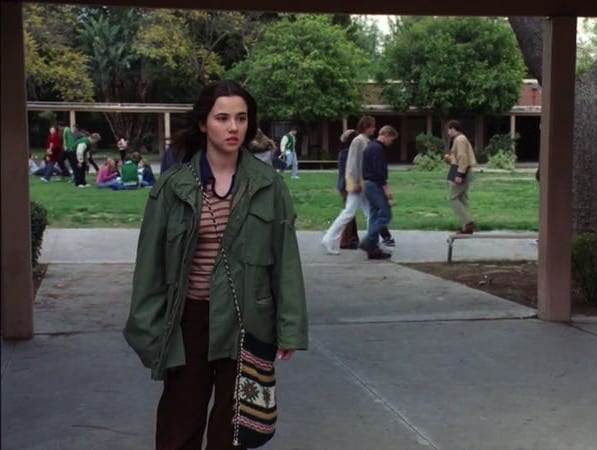
Sam’s revelation is that he’ll have to confront his nemesis, Alan. It becomes clear in gym class dodgeball that Alan is going to be a relentless opponent until he’s put in his place. The whole dodgeball scene is shot like a big strugglefield, with a terrifically claustrophobic feel. (This scene is an homage to Saving Private Ryan. In several ways, Freaks and Geeks provides its own unique spin on the “high school is hell” metaphor.)
Sam also has a revelation that Cindy likes him. While he never considered her as a prospect for the dance before, now he thinks he should pursue it.
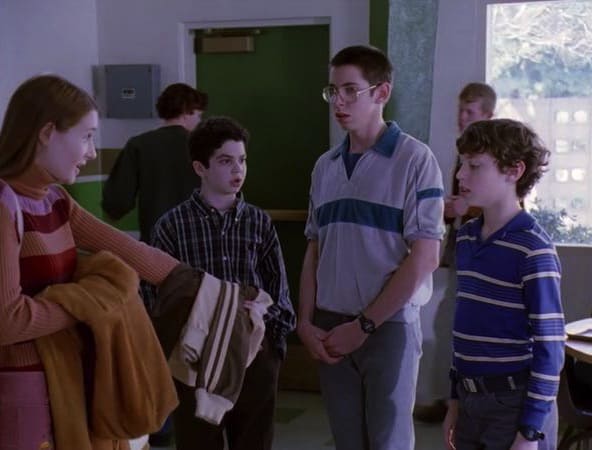
Plan
Lindsay plans to approach the freaks and avoid Millie like the plague. Unlike in previous years she’ll resist joining the Mathletes just because she happens to be great at math. She plans not to go to the dance, which is symbolic of everything she hates about high school.
Sam and crew plan to avoid Alan and his crew. “Forever?” “For the next four years.” They also get advice from their mystic senior who seems to have the world sorted, albeit in his own way. Sam plans to go to the dance with Cindy, the prettiest most popular girl in their year.
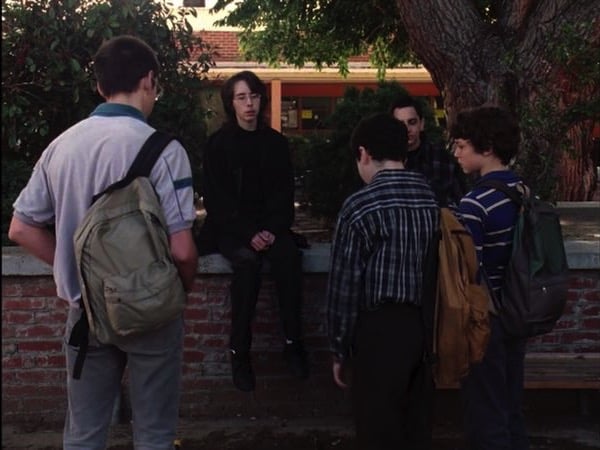
Opponent’s plan and main counterattack
Lindsay’s plan to avoid the Mathletes is opposed by the guidance counsellor who needs her on the team to win. She is opposed by Millie, who has the same goal as the counsellor but is better able than him to sabotage Lindsay’s plan to align herself with the freaks. She is opposed in her plan to avoid the dance by her father’s ultimatum — she can either attend or work in his store serving hunters that night.
Sam’s plan to avoid Alan is opposed by Alan himself, who seems to follow them around. (We later find it’s because he’d secretly like to join their little gang.) Sam’s plan to go to the dance with Cindy is foiled by the jock who’s already going with her.
Drive
Lindsay’s drive to distance herself from people she doesn’t like, while becoming one of the ‘disliked’ continues to get stronger and stronger as we see her stick up for herself and for other people in a variety of circumstances.
Sam and co are losing big time to Alan for almost the entire show. It’s only at the end that Alan is defeated, for now.
Attack by ally
Millie’s speech about mathletes comes near the beginning, and later we have Mr Rosso (fake ally opponent) who attacks Lindsay’s burn-out wishes after he catches her wagging.
Neal is Sam’s voice of reason throughout this season — he is dubious about their ability to defeat Alan and his team. He’s also dubious about Sam’s ending up with Cindy. Neal assesses the situation with one of the episode’s best lines: “She’s a cheerleader. You’ve seen Star Wars 27 times. You do the math.”
Apparent defeat
Lindsay: She hates the school so decides to try and make the place better. She does this by sticking up for the downtrodden. First her brother — it backfires — and then with Eli — it backfires even more. The Eli subplot is clever because it is a microstory of what happens between Lindsay and Millie. Millie was shown stepping into Lindsay’s social situation and sabotaging it, and with the same good intent.
Lindsay is doomed to attending the dance. Moreover, she’s attending with the least cool person in school, and even he hates her. What could be worse for Lindsay?
(Sam’s storyline)
He just can’t seem to get away from Alan. He’s everywhere, from the most public (school grounds) to private of places (the gym locker room)
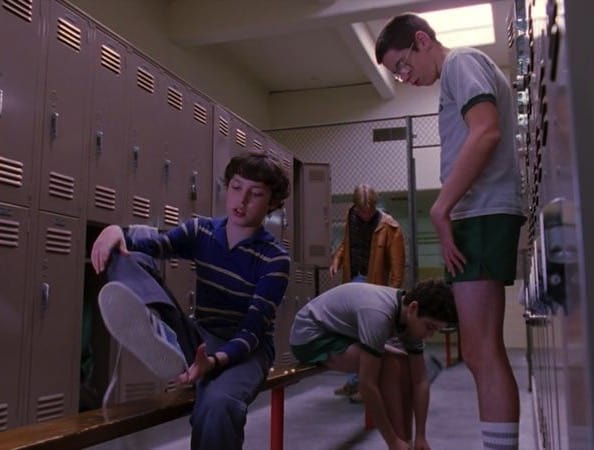
Obsessive drive, changed drive, and motive
Lindsay realises she can stand up to Mr Rosso and that high school needn’t be the prison she feels it to be if she could only find some burnout allies. She intends to have a good time at the dance.
Sam and co realise that they can beat Alan if they stick together, and they’re not as downtrodden as they feared. Sam intends to win Cindy over at the dance despite her going with someone else because at least she has promised to have a dance with him. Sam’s new desire is to win Cindy.
Sam’s other trouble of the episode, equally realistic, is the bully Alan. Apart from the aforementioned teaser scene, Alan picks on Sam in the lunchroom. Sam does what he believes is right – he calls an adult. Unfortunately, Mr. Kowchevski looks down on Sam’s decision, telling him to “be a man”. The comment stings because it touches on Sam’s problem – in high school, you’re expected to grow up, but there’s no clear guide on how to do so. If anything, growing up is a personal action. From this point on, Sam sets himself on a path to “be a man” – although the results of this decision, as we see in many future episodes, are anything but perfect.
Second revelation and decision
Lindsay: Her attempt to make the school a nicer place falls flat so she thinks to hell with it, and skips school for the first time in her life.
Sam: Despite everything he somehow wins at dodgeball, which means he thinks he might have a fighting chance against the bully and his crew.
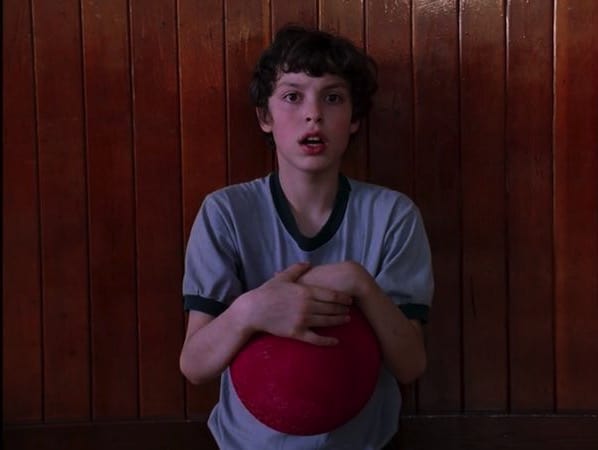
Audience revelation
Although foreshadowed through the episode, “I’m just glad your grandmother isn’t here to know about this,” (Lindsay’s smoking), it’s not until the scene in Lindsay’s bedroom and the conversation between her and Sam that we learn why Lindsay is acting out.
The audience realises in the drum kit scene how different Lindsay is from Nick, who mansplains to her all about how to find one’s path. We realise this before Lindsay does, although we may not have picked it yet, because we haven’t actually heard him play. (He’s terrible. With Nick it’s all about the image, not about the practice.)
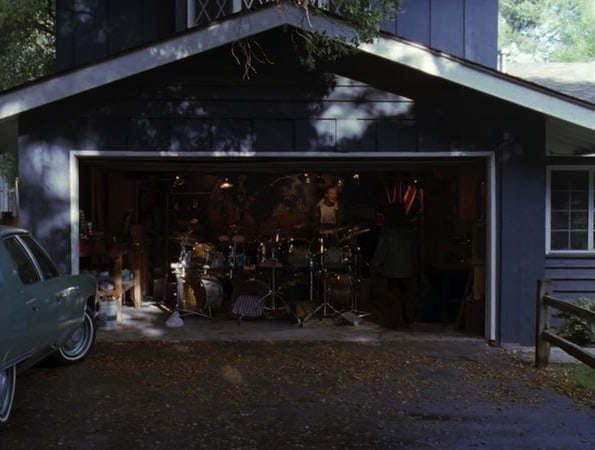
Third revelation and decision
Lindsay: Whatever she does, she’s screwed. She realises this when ‘Jeff’ catches her skipping out on school. She’ll grin and bear her punishment of serving drinks at the dance but she’s not going to dress up, and she’s not going to enjoy it.
Sam: The fight is set up. He’ll do it.
Gate, gauntlet, visit to death
The boys realise that especially without their third teammate they are dead meat against Alan and his buddies. Here they contemplate their impending deaths.
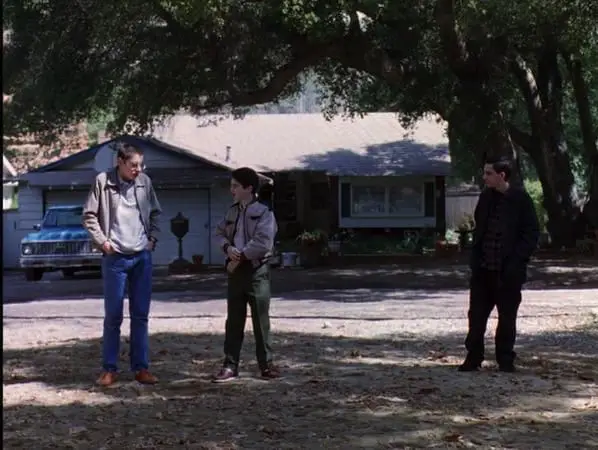
Sam has already had a visit to death in the big struggle — albeit slightly more controlled — in P.E.
His visit to death comes when he’s held up by the love interest. He feels he can’t not talk to her now that she’s approached him. This scene represents Sam’s two conflicting goals right now: He wants to defeat Alan but he also wants to ask Cindy to the dance. The ticking clock technique is used in this sequence to up the stakes and excitement for the audience. Characters keep looking at their watch.
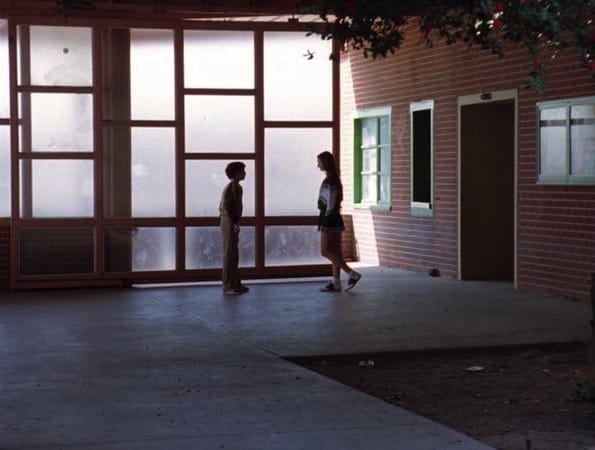
Battle
Lindsay: The first shouting of the show happens at the dinner table. The counsellor has called home to inform her parents she skipped class. The audience has already seen how irritating the father is, always giving his kids doomsday messages which are obviously made up. Lindsay feels infantilised and storms out. Lindsay’s main opponents are all the adults in her life, but she can only safely shout at her parents.
Sam: The ‘big’ fight (which he misses — though there is comically a very reluctant stand-in who gets his just desserts).
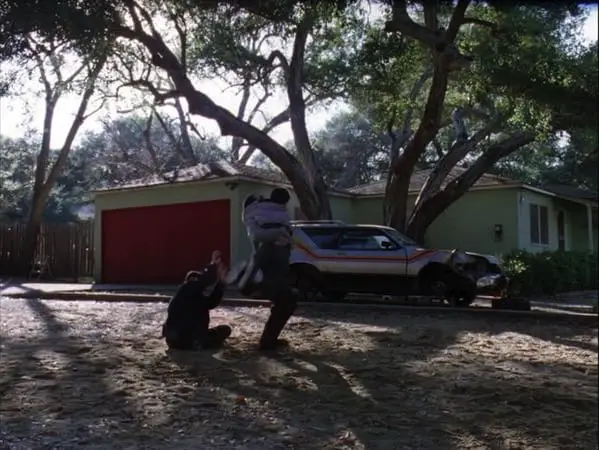
Anagnorisis
Bill and Neal realise they’re not so hopeless after all.
Fortified by the strength of his buddies who fought on his behalf, Sam finds it within himself to go up to Cindy at the dance and (albeit awkwardly) claim his promise of a dance.
Lindsay seems to have a anagnorisis when she sees her little brother plucking up the courage to ask Cindy to dance.
Moral decision
Even though it’s scary, Sam marches into the dance and asks Cindy to dance.
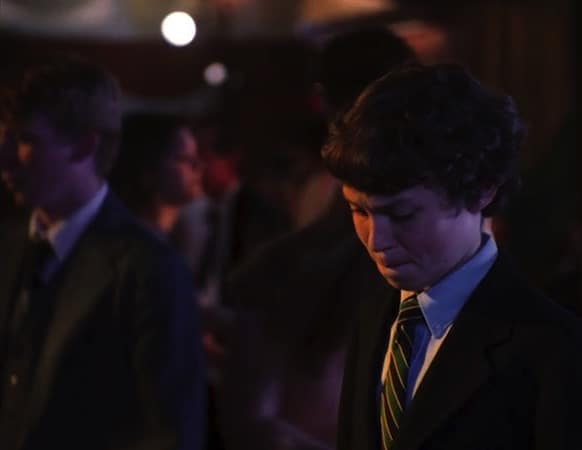
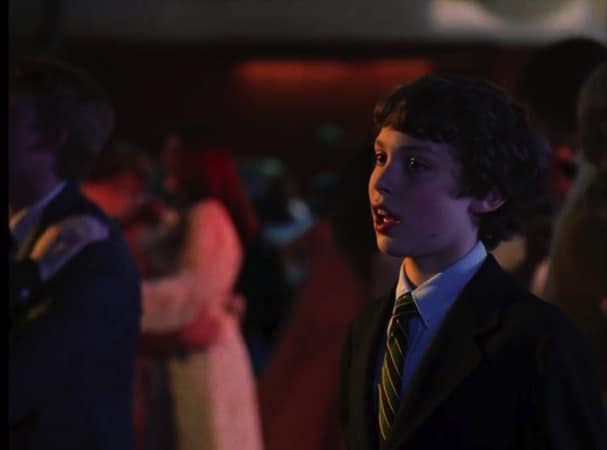
Lindsay decides to dance with Eli. Despite having every reason to ‘hate high school’, she is able to cast aside all of her social issues for a few minutes and really let go.
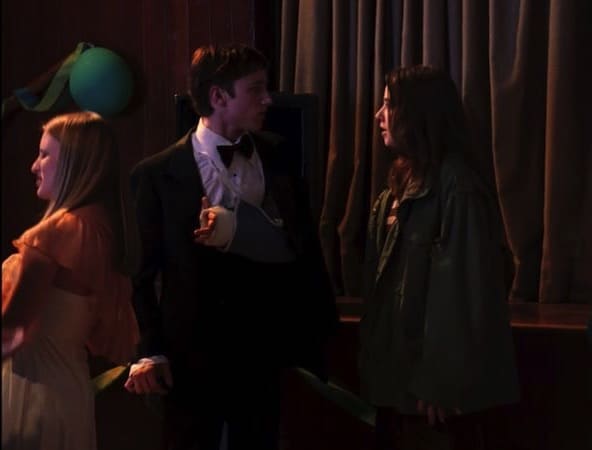
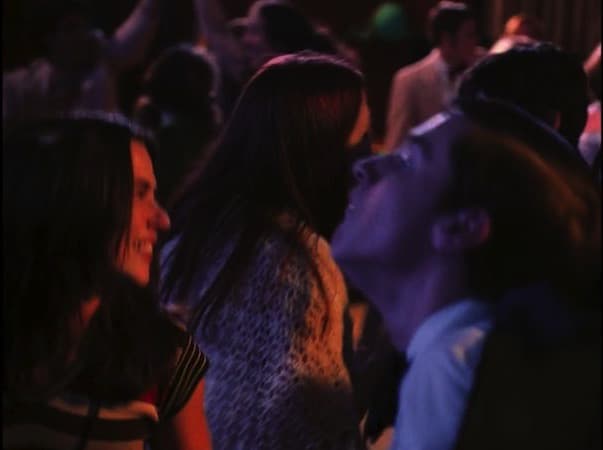
New situation
Sam has taken his first step on the way to manhood — asking a girl he likes to dance (kind of).
At the end of the episode, Lindsay has found a way to ‘let go’. This will be echoed in a more rebellious fashion in the final episode as she takes off in the hippie van.
OTHER STORYTELLING TECHNIQUES
Juxtapositions
- The title itself is a juxtaposition: freaks are at the opposite spectrum from geeks.
- These “freaks” are grungy and acerbic, with an instantly recognizable carefree attitude. There is no struggling to find the right words, as the jock and cheerleader did – they just speak whatever’s on their minds. This stark, abrupt contrast makes the freaks appear lowly and repellant, but there is something uniquely charming about their nature.
- The different soundtracks that accompany the kids on the bleachers vs below.
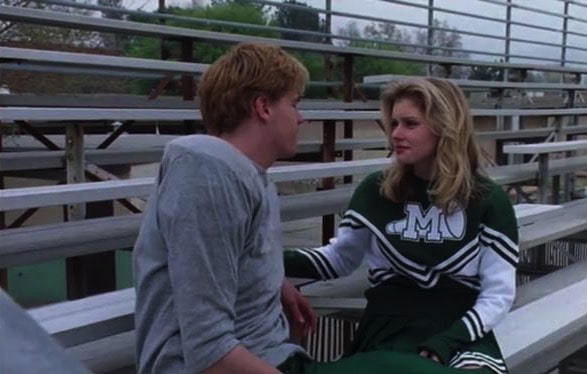
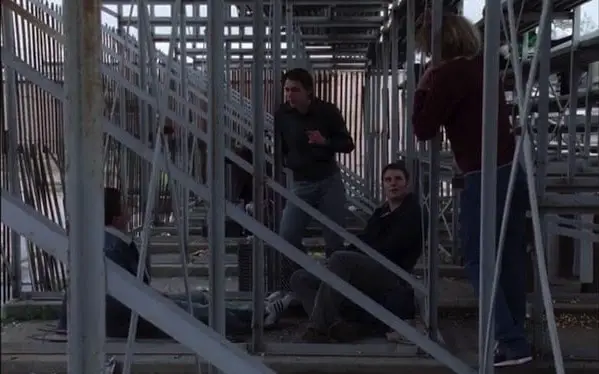
- Daniel talks about wearing a t-shirt with an executioner on it to church
- They fear change, and are confined to the sensibilities they grew up with during their younger years. Yet high school is all about change
- Right after the boys’ PE lesson, which is a veritable big strugglefield, there are a couple of very brief shots of the girls outside on the green, under the sunshine, working together. This show says a lot about the gender divide. The scenes of the girls playing nicely together emphasise the horror of the PE class set up by the jock teacher.
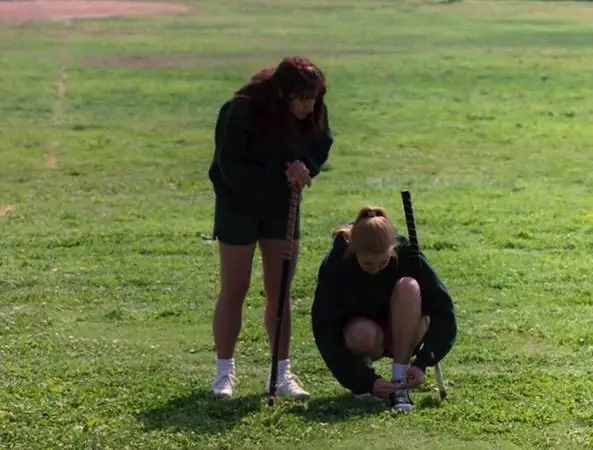
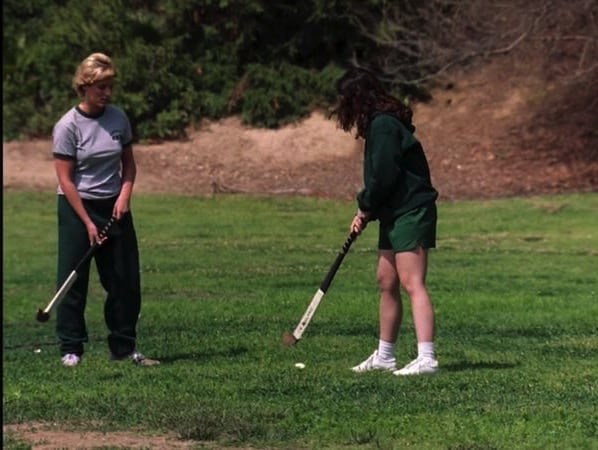
- Lyndsay’s face against the Boy Scouts Of America certificate in the counsellor’s office
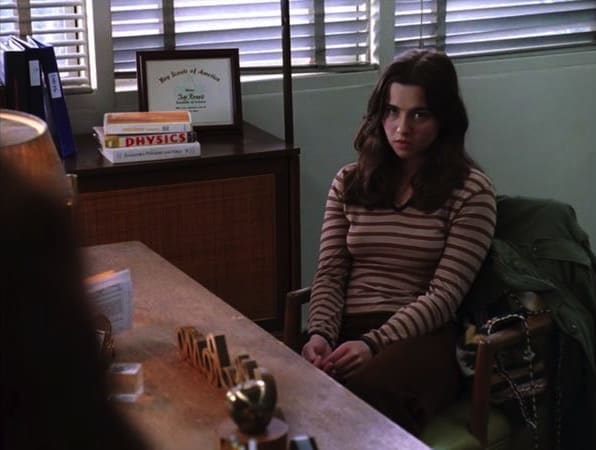
- At the start of the show the three most boyish kids in the school stand under a toilet block sign that reads ‘men’.

Ironies
- Lindsay cuts class in middle of a “professional career” video
- Harold’s earnest sermonising backfires because he goes too far with the ridiculous stories. Mr. Weir’s ideas of “bad role models” included two star musicians (Janis Joplin and Jimi Hendrix) and a president (JFK)
- Lindsay’s sticking up for Eli ends up with him hating her
- Sam misses the big fight and sacrifices his buddies for the chance to ask Cindy to the dance, only to find she’s already going with Dan Lewis
- Sam tells his friends he’s definitely going to have a ‘slow dance’ with Cindy but as soon as they actually reach the floor the music changes and they end up dancing manically
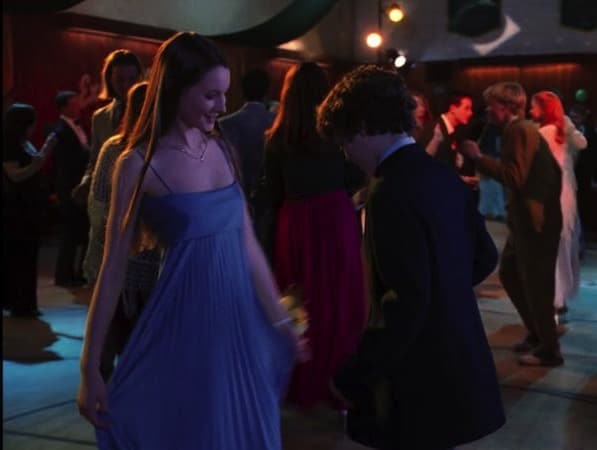
- Bill’s stomach no longer hurts after the fight (but everywhere else does) and now that other guy’s stomach hurts instead, when he only meant to watch
- Lindsay is forced to go to the dance, but this is the happiest we’ve seen her all episode
- Even though Mr Rosso appears to be the inverse of the jock P.E. teacher, even a motto on his desk shows that actually he’s cut from the same cloth. (Mr Rosso is to Lindsay as the P.E. teacher is to Sam.)
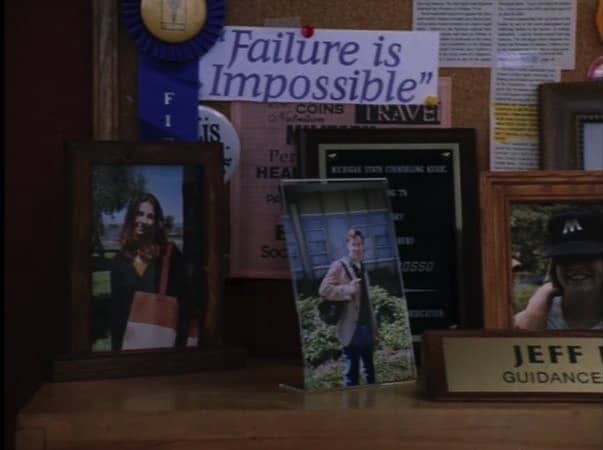
- Double irony with the lunch bag: Bill is one of the tallest in his year, and the well-meaning note is the worst thing his mother could do in her attempt to build up his self-esteem.
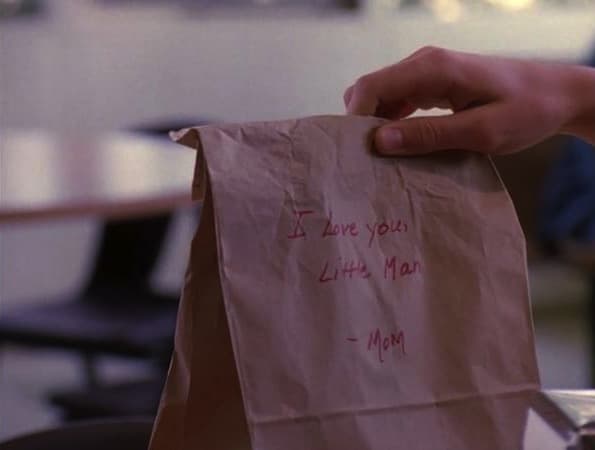
THE FREAKS AND GEEKS GEEK TRIO
When there is a group of geek boy outcasts we very often have the following character breakdown:
- The Aspergers type — A nice guy but not written to be relatable to the audience. Off doing his own thing.
- The skeevy, misogynist whose main desire line is getting laid — not getting a girlfriend — getting laid. He generally exaggerates his own sexual experience.
- The nice guy who for whatever reason relevant to the story has found himself with these guys. This is the character the audience will relate to.
In real life it’s unlikely that this trio would like each other. They are forced to hang out together because they share in common the status of being outcasts. This provides lots of scope for conflict within the group, on top of the more serious conflict they get from outsiders.
Too often a lot of the humour derives from the skeevy misogynist making disgusting jokes which is supposed to demonstrate his complete lack of prowess with girls. He does this by objectifying them, and this doesn’t necessarily change over the course of the story. His hyper sexuality contrasts with the other boys’ asexuality, or burgeoning sexuality. However this plays out, the fact is, girls have their bodies objectified.
In Freaks and Geeks it breaks down to:
- Bill Haverchuck
- Neal Schweiber
- Sam Weir
In the indie film The Birder’s Guide To Everythigng (2013) we have:
- Peter Nessbaum
- Timmy Barsky
- David Portnoy, who is an outcast not through any character defect of his own but because he’s into birding.
Added to this trio we have the girl, brought in as a classic female maturity formula, to provide the girlfriend for our nice guy and to school the skeevy guy up on the extent of his skeeviness, and also to point out a home truth — that the girl whose homework he’s doing calls him the homework hobbit.
One of the first two geeks is likely to have a serious medical condition, like peanut allergy in Bill Haverchuck’s case, or asthma in Peter Nessbaum’s case. (Asthma is a common one.)
The IT Crowd gives us two out of the three as males:
- Moss is the Aspergers guy
- Roy Trenneman is the skeevy geek
- Jen is more real to the audience, who relates to the less techy among us. Her femaleness makes the boys nervous. (It is also part of what makes her clueless when it comes to computers.)
When considering this from a ‘head, heart, guy’ triad, the Aspergers guy is Head, the skeevy misogynist is ‘gut’ (as proxy for genitals) and the relatable average guy is Heart.
